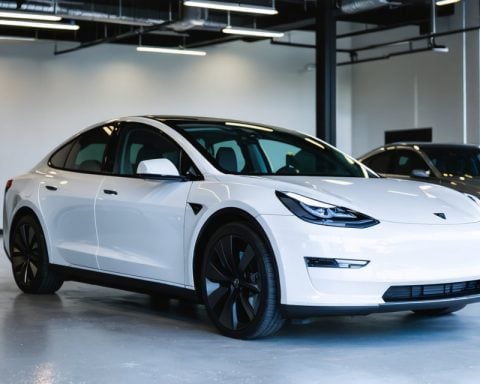Electric vehicle (EV) enthusiasts have a fantastic opportunity to significantly cut down on their driving costs. EDF Energy is enticing both newcomers and existing customers with an incredible offer that provides £300 towards a home charging solution, allowing electric car owners to enjoy nearly two years of free driving.
The compelling deal includes the Pod Point Plug & Power home charger, typically priced at £1,099, now available for just £499. This lower upfront cost can be conveniently spread across two years, integrated into the accompanying electricity tariff which offers competitive rates. Additionally, the tariff includes cheaper overnight electricity costing only 8.49p per kWh.
To take advantage of this offer, customers need to visit EDF’s website and sign up. Upon registration, the company will coordinate with Pod Point for the installation, ensuring that the £300 credit is reflected in their account within 30 days. With standard installation and a five-year warranty included, the Pod Point Solo 3S charger also allows users to manage their charging through a dedicated app.
For electric car owners who primarily charge at home, the savings are remarkable. A couple charging predominantly at home can expect to spend only £660 annually to power their vehicle, in stark contrast to the £1,430 spent by traditional car owners on fuel. This offer is set to expire on January 31, 2025, making it an opportunity that shouldn’t be missed.
Revolutionizing Transportation: The Impact of Electric Vehicles on the Future
As electric vehicle (EV) ownership continues to rise, the recent initiative by EDF Energy to provide substantial savings for EV owners reflects a broader trend that has significant implications for the environment, humanity, the economy, and the future of transportation. This strategic move not only encourages more consumers to transition to electric vehicles but also signals a shift toward sustainable practices that are essential for protecting our planet.
One of the most direct ways that increased electric vehicle adoption impacts the environment is through reduced greenhouse gas emissions. Traditional internal combustion engine vehicles emit CO2 and other harmful pollutants that contribute significantly to climate change and air quality degradation. In contrast, electric vehicles produce zero tailpipe emissions. As more individuals make the switch to EVs, particularly with financial incentives such as EDF’s offer, we can expect a notable decrease in air pollution and a positive impact on public health outcomes. Cleaner air leads to fewer respiratory illnesses and lower healthcare costs, improving overall quality of life in urban areas where vehicular congestion and pollution are most acute.
Economically, initiatives like the one from EDF Energy also pave the way for the growth of the green energy sector. The installation of home chargers and the demand for renewable energy sources to power these vehicles creates new job opportunities in both the manufacturing and installation sectors. As the market for electric vehicles expands, so too does the ecosystem that supports it, fostering innovation and encouraging investment in clean technologies. Transitioning to electric vehicles could save consumers money on fuel in the long run, leading to increased disposable income for families, which can stimulate local economies.
Furthermore, the implications of this shift extend to global politics and economy. The collapse of fossil fuel dependency could significantly alter the geopolitical landscape, reducing the influence major oil-exporting nations have on global markets. With renewable energy sources becoming more viable and cost-effective, nations may become less susceptible to the fluctuations of oil prices, allowing for greater independence and enhancing energy security.
Looking to the future, the push for electric vehicles reflects a broader commitment to sustainability that will define our development trajectory. As cities adapt to accommodate more EVs—introducing charging infrastructures in public spaces and making urban areas more pedestrian-friendly—we will likely see a significant transformation in urban planning and community structures.
In conclusion, programs like the one from EDF Energy not only offer immediate financial relief for EV owners but also contribute to a significant paradigm shift toward sustainable transportation. As the world increasingly embraces electric vehicles, we can envision a future where cleaner air, healthier populations, and robust economies are not just goals but realities. The commitment to electrifying our transportation systems illustrates the profound connections between environmental responsibility, economic growth, and the well-being of humanity, ultimately shaping a more sustainable future for generations to come.
Unlock Savings: How EDF Energy’s EV Offer Can Slash Your Charging Costs!
Introduction
Electric vehicle (EV) ownership is becoming increasingly attractive, not only for its environmental benefits but also for the potential cost savings. EDF Energy is currently offering an exceptional deal that provides significant financial incentives for both new and existing EV owners. This article explores the benefits of this offer, how it works, and presents key insights you need to know.
Key Features of EDF Energy’s Offer
1. Financial Incentives: EDF Energy is offering a £300 credit towards home charging solutions, effectively reducing the upfront cost of the Pod Point Plug & Power charger from £1,099 to just £499.
2. Affordable Tariff Rates: The accompanying electricity tariff features reduced pricing at just 8.49p per kWh during off-peak hours. This allows EV owners to charge their vehicles overnight, taking advantage of the lower rates.
3. Flexible Payment Options: Customers can spread the cost of the home charger over two years, integrating it seamlessly into their electricity bill.
4. Comprehensive Installation Service: Upon signing up, EDF will coordinate with Pod Point for charger installation, ensuring a hassle-free process for the customer.
5. Featured Technology: The Pod Point Solo 3S charger includes standard installation and a five-year warranty. Importantly, it comes equipped with an app to help users manage their charging effectively.
How to Take Advantage of the Offer
To benefit from this promotion, customers must:
– Visit EDF’s website to sign up for the energy plan.
– Wait for coordination from EDF and Pod Point for the installation of the charger.
– Expect the £300 credit to be applied within 30 days of account registration.
Pros and Cons of Choosing EDF Energy’s EV Offer
Pros:
– Significant savings on both charger purchase and electricity rates.
– Reduced driving costs compared to traditional fuel prices, potentially around £660 annually for home charging versus £1,430 for petrol or diesel.
– Enhanced management with a dedicated charging app.
– Five-year warranty offers peace of mind regarding the charger’s performance.
Cons:
– The initial outlay, even at a discounted rate, may still be a barrier for some.
– Limited to customers who primarily charge at home – those who frequently use public charging may not find as much value.
– Offer expiration date of January 31, 2025, creates urgency but could limit long-term planning.
Comparisons: EV Charging Costs vs. Traditional Fuel Costs
When considering switching to an EV, it’s crucial to compare the long-term costs:
– Electricity Costs: Charging predominantly at home (estimated annual cost: £660).
– Fuel Costs: Traditional petrol or diesel car owners can expect to spend around £1,430 annually.
Insights and Predictions
The electric vehicle market continues to grow as governments mandate lower emissions and more consumers turn toward sustainable transportation options. Introductions of competitive tariffs like EDF’s indicate a trend which favors both customers and the environment. Predictions suggest that such offers will become more common, providing further financial incentives for EV adoption.
Security and Sustainability Aspects
As more individuals opt for electric vehicles, the importance of sustainable energy sources increases. EDF’s plan not only makes EV ownership more economical but also emphasizes renewable energy, potentially leading to a decrease in overall carbon emissions.
Limitations
While the offer provides substantial savings, it might not cover all user needs:
– This deal primarily targets home chargers; users reliant on public charging networks may not see these savings.
– Consumers must qualify for the related services provided by EDF and Pod Point, which may limit participation.
Summary
With EDF Energy’s enticing offer, electric vehicle ownership has never been more appealing. The combination of substantial financial savings, competitive rates, and effective technology makes this a golden opportunity for potential and existing EV owners. Don’t miss out on this limited-time promotion as it is set to expire on January 31, 2025. For more details, visit EDF Energy.













